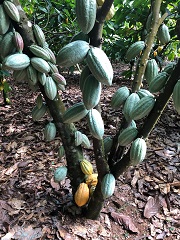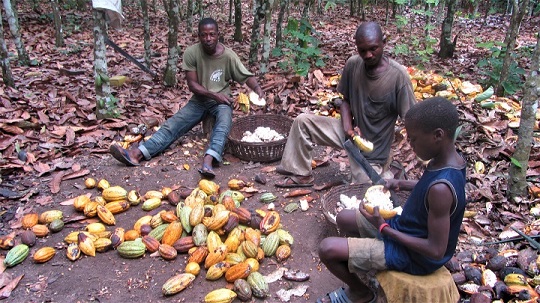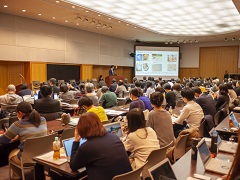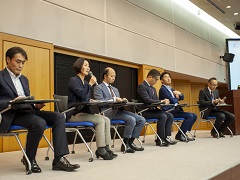- Home
- News & Features
- News
- FY2019
- Co-creating a platform for the sustainable future of chocolate and developing countries
News
March 12, 2020
Co-creating a platform for the sustainable future of chocolate and developing countries
Are you aware that chocolates we casually enjoy has numerous issues behind the scenes?
 Ghanaian cacao, the raw material for chocolate
Ghanaian cacao, the raw material for chocolate
Currently, Japan imports more than 70% of its cacao, the raw material for chocolate, from Ghana in West Africa. However, a little known fact is that about one in five children is engaged in child labor in the country. The Ghana cocoa industry has been faced with the problem while it has been battling other challenges, including, for example, the destruction of forests.
JICA is working to create a platform for collaborative support with companies, industry groups, and NGOs to resolve the challenges which cocoa industry faces in developing countries, including Ghana.
 The production of cocoa in Ghana is primarily undertaken by small family farmers. As children are an important source of labor, this causes child labor problems. (Photograph courtesy of ACE, an authorized NPO)
The production of cocoa in Ghana is primarily undertaken by small family farmers. As children are an important source of labor, this causes child labor problems. (Photograph courtesy of ACE, an authorized NPO)
Establishing a “Sustainable Cocoa Platform”
According to an announcement by the World Cocoa Foundation (WCF) and the National Oceanic and Atmospheric Administration (NOAA), the impact of global warming and deforestation could lead to lower cocoa production. Also, for small cocoa farmers, children are important source of labor due to the shortage of workers. Another issue is that these farmers are stuck in a vicious circle of low productivity due to the lack of technology and knowledge.
Through exchange of opinions with governments, companies, and related organizations, JICA established the “Platform for Sustainable Cocoa in Developing Countries” in January 2020, in recognition of the need for a forum where concerned parties can gather and work together to address issues, for achieving sustainable development of cocoa industries.
This platform is a forum where companies, industry associations, NGOs, and others share information and experiences and work together to resolve various issues and to “realize a socially, economically, and environmentally sustainable cocoa industry.” As of Feb. 10, nine organizations, including industry associations such as the Chocolate and Cocoa Association of Japan, LOTTE Co., Ltd., Morinaga & Co., Ltd., and other confectionery companies, and ACE, an authorized NPO that tackles child labor, have registered.
Solving the issue of child labor
Ghana has ratified the International Labour Organization (ILO) Worst Forms of Child Labour Convention, and prohibits child labor that could threaten the health or lives of children under domestic laws. However, the current situation in the cocoa industry remains little improved. Children are being forced to engage in dangerous work such as clearing forests, bush burning, working with agrochemicals and pesticides, and cracking open cacao beans with large knives.
 Although compulsory education is guaranteed in Ghana, many children are deprived of their right to learn by engaging in child labor under the pretext of “helping their families” (Photograph courtesy of ACE, an authorized NPO)
Although compulsory education is guaranteed in Ghana, many children are deprived of their right to learn by engaging in child labor under the pretext of “helping their families” (Photograph courtesy of ACE, an authorized NPO)
To solve the problem of child labor in the cocoa industry, all stakeholders need to tackle a wide range of issues, including education, economy, and technological innovation. To achieve this, it is expected that the government, companies, NGOs, the media, and researchers will deepen their cooperation by utilizing this platform going forward.
Strengthening dissemination from Japan, the world’s sixth largest consumer of chocolate
 More than 130 people participated in the public event, and a large number of media organizations attended, which showed the high level of interest in the platform (venue: JICA Ichigaya Building)
More than 130 people participated in the public event, and a large number of media organizations attended, which showed the high level of interest in the platform (venue: JICA Ichigaya Building)
To kick-off the establishment of the platform, a public event entitled “SDGs and Chocolate: What we can do for a Sustainable Future” was held on Feb. 5, in which companies and NGOs announced their respective initiatives related to Sustainable Cocoa. Among them, Deloitte Tohmatsu Consulting LLC introduced the concept of aiming at a tax exemption of goods without child labor.
SHIROKI Tomoko of ACE, an authorized NPO dedicated to the elimination of child labor, said the following with regards to the start of this platform.
 At the panel discussion, Meiji Co., Ltd., ACE, an authorized NPO, Deloitte Tohmatsu Consulting LLC, Ezaki Glico Co., Ltd., and Tachibana & Co., Ltd. participated. Organizations engaged in various initiatives from various perspectives gathered at the same venue to exchange views on the issues facing the cocoa industry.
At the panel discussion, Meiji Co., Ltd., ACE, an authorized NPO, Deloitte Tohmatsu Consulting LLC, Ezaki Glico Co., Ltd., and Tachibana & Co., Ltd. participated. Organizations engaged in various initiatives from various perspectives gathered at the same venue to exchange views on the issues facing the cocoa industry.
“Governments, companies, and NGOs can each play different roles. In order to resolve large-scale issues such as deforestation and child labor, it is important for each organization to make the most of their strengths, so I think it is worthwhile to have a platform where information can be exchanged. Japan ranks sixth in the world in terms of chocolate consumption and thus has international influence. I would like us to consider how Japan can have a major impact going forward.”
Countries such as Germany, Belgium, Switzerland already have mechanisms in which governments and companies collaborate on the theme of Sustainable Cocoa. With a view to future collaboration, JICA is committed to focusing on working with relevant parties, not only domestically but globally, in order to create a sustainable society in which chocolate is produced from cacao without child labor.
Related Link
- About JICA
- News & Features
- Countries & Regions
- Our Work
- Thematic Issues
- Types of Assistance
- Partnerships with Other Development Partners
- Climate Change / Environmental and Social Considerations
- Evaluations
- Compliance and Anti-corruption
- Science and Technology Cooperation on Global Issues
- Research
- JICA Development Studies Program / JICA Chair
- Support for the Acceptance of Foreign HRs / Multicultural and Inclusive Community
- Publications
- Investor Relations





